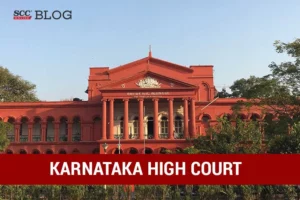Karnataka High Court: While deciding the instant petition challenging the proceedings for offences under Section 498-A read with Section 34 of Penal Code, 1860 and Section 4 of Dowry Prohibition Act, 1961, the bench of M. Nagaprasanna, J.*, held that husband’s unwillingness to physically consummate the marriage due to his spiritual inclination, would undoubtedly amount to cruelty due to non-consummation of marriage under Section 12(1)(a) of the Hindu Marriage Act, 1955 and not cruelty as defined under Section 498A of the Penal Code, 1860.
Background: The husband and wife got married in December 2019, however, the wife resided in her matrimonial home for a brief time as their marriage turned sore almost immediately. In February 2020, the wife initiated criminal case against her husband and in-laws under Section 498-A, Penal Code, 1860 and Section 4 of Dowry Prohibition Act, 1961. She further moved to annul her marriage on ground of cruelty under Section 12(1)(a) of the Hindu Marriage Act, 1955.
As per wife’s complaint, the husband never showed any interest in physical relations. He was always detached and always used to watch videos of Brahmakumari sisters. The wife also stated that the husband told her that he is not interested in physical relationship because love is not just getting physical, one should have a soul-to-soul love.
Eventually the marriage was annulled in 2022, but the proceedings for demand of dowry and cruelty were still going on.
Contentions: The counsel for the husband sought quashment of the proceedings arguing that the allegations did not meet any of the ingredients of the offence punishable under Section 498A. it was further argued that wife stayed at the matrimonial house only for 28 days and on the ground that the marriage had not consummated, initiated proceedings in registered a crime for offence under Section 498A. Husband’s parents who had nothing to do with the issue have been dragged into the web of crime without any rhyme or reason.
Per-contra, the wife’s counsel argued that the husband’s parents had deliberately got their son married to her. The husband never showed any interest to develop physical relationship with the wife and, therefore, the wife was constrained to seek annulment of marriage. It was submitted that since the proceedings under Section 498-A and Section 12(1)(a) are ongoing, therefore the instant petition should be dismissed.
Court’s Assessment: Perusing the facts and contentions, the Court firstly examined the wife’s complaint, wherein she detailed her grievances with the husband’s attitude, especially his unwillingness to consummate their marriage due to his belief in the Brahmakumari spiritualism. Insofar as the other accused persons are concerned i.e., father-in-law and mother-in-law, the Court noted that the wife allegation is that they had demanded dowry at the time of marriage and have instigated their son.
The Court also noted that decree of annulment has been well accepted by the husband.
However, the Court deliberated that whether the proceedings against the in-laws should continue. The Court further stated that Section 498-A has two parts which define cruelty- (1) Cruelty would mean any wilful conduct which is of the nature as is likely to drive a woman to commit suicide or cause grave injury or danger to the life; and (2) Harassment, where such harassment is with a view to coercing her or any person related to her to meet any unlawful demand.
The Court was of the view that the complaint did not indicate any of the afore-stated ingredient vis-à-vis cruelty by in-laws. “It is an admitted fact that the parents never stayed with the couple. In the teeth of such facts, if further proceedings are permitted to continue against the parents, it would become an abuse of the process of law and run afoul of the judgment of the Supreme Court in the case of Kahkashan Kausar v. State of Bihar, (2022) 6 SCC 599”. Thus, the Court held that proceedings against the in-laws needs to be eliminated.
Regarding the complaint against the husband, the Court noted the averment that the wife knew about the attitude of the husband. Even then, she got married due to the force of elders of the family thinking that the husband would become alright and stayed only for 28 days in the matrimonial house. The Court pointed out neither the complaint nor the summary charge sheet narrated any incident that would become an ingredient of Section 498-A. The main allegation is regarding her husband watching videos of Brahmakumari sisters and under the influence of those teachings, he did not consummate his marriage. The Court was of the view that such an act by the husband falls under “cruelty” as enumerated in Section 12(1)(a) of Hindu Marriage Act, 1955 and not Section 498-A of Penal Code, 1860.
The Court did not find any ingredient against the husband and was of the view the impugned proceedings if permitted to continue would degenerate into harassment, become an abuse of the process of law and ultimately result in miscarriage of justice.
Based on afore-stated findings, the Court quashed the impugned criminal proceedings against the husband and the wife’s in-laws.
[Aiyappa M.B. v. State of Karnataka, 2023 SCC OnLine Kar 30, decided on 16-06-2023]
*Order by Justice M. Nagaprasanna
Advocates who appeared in this case :
Petitioner- M.R.C. Manohar, Advocate;
Respondents- K.P. Yashodha, HCGP FOR R-1;
K.S. Karthik Kiran, Advocate FOR R-2.

